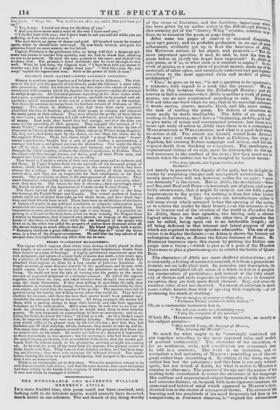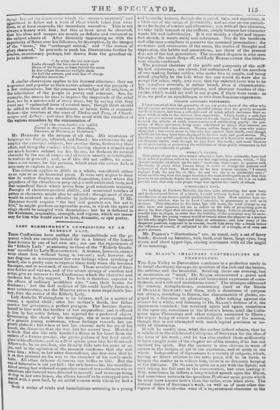THE HONOURABLE AND REVEREND WILLIAM HERBERT'S ATTILA.
Ira a more fruitful time, this poem could not have received, and, looking only to its intrinsic merits, would scarcely have deserved, much notice in our columns. The sad dearth of any thing worthy
of the name of literature, and the factitious importance whiali' has been given by an undue notice in the Edinburgh Review to this seeming pet of the "literary IV hig coteries, combine to in, duce us to examine the poem at some length. After some ten pages of shallow or unsound disquisitiea upon epic poetry, and its probable production in an age of Reel& f: refinement, evidently got up to float the heaviness of Atria
the Reviewer arrives at his object, and proceeds—" But the
more important question, it may be said, is, how far does the poem before us justify the hopes here expressed Is Attila epic poem, or if so, to what rank is it entitled to aspire ? Is ;an . work of genius, or a mere piece of poetical mosaic, made up (Atha , materials of other epics, and cunningly contrived and put together according to the most approved rules and models of poetical architecture?"
Si This,' he goes on to say, " is not a question to be answeredj4 a sentence, with regard to a work like the present." We are bolder in this instance than the Edinburgh Review; and eih answer in half a sentence—that Attila is neither a work of poetical genius, nor an epic constructed according to rule. Those aho will not take our word when we say, that in its essential substance it wants nerves, sinews, muscle, blood, and life, must undergo the task of reading the poem. Its defects of structure can more easily be made intelligible. The fable of an epic, IC. cording to ARISTOTLE, must have a "beginning, middle, and end,' to give unity of action and concentrated interest ; but there is no is," more epic unity of action in Attila than there is in a campaign MARLBOROUGH or WELLINGTON; and what is a good deal worse, T.t no action at all. The events are literally copied from ATTU: Roman war ; and consist of his defeat at CliCilons, the siege or Aquileia, his ensuing Italian campaign and retreat, and his suls sequoia death from drinking or conspiracy. The machinery, supernatural beings of an epic, must be conformable to the age, and necessary to the conduct of the story ; but they must not in. terfere when the matter can be disentangled by human means:
"Nee miens intersit, nisi dignus vindice nodus Incident t"
not merely to preserve the dignity of the gods, but to delight the reader by surprising changes and unexpected extrieations. The
merely marvellous will not, however, suffice for an epic: "sped. osa miracula" is the canon. But in Attila, the machinery—Satan and Sin, and Paul and Peter—is borrowed, out of place, and so pee. fectly unnecessary, that it might be entirely cut out with a great improvement to the poem; for nothing is done but what history has already related. Epic episodes are introductions either to tell some event which occurred before the opening of the action, or to relieve the reader by their beauty ;—as the accounts of the war in heaven and of the creation of the world in Paradise Lott In Attila, there are four episodes, two having only a chrono- logical relation to the subject ; the other two, if episodes they can be called, being spun out to an intolerable length; and all being deficient in that interest and latent purpose of relief which are required to render episodes admissible. The use of epic vision is to display the future ;—as Adam is shown the history and redemption of man, or lEneas the future fortunes of Rome. Mr, HERBERT improves upon this canon by putting the Italian cans paign into a vision ;—which is just as if a poet of' the Hundred Days were to plan a phantasmagoria to exhibit the battle of Quake Bras.
The characters of Attila are mere shadowy abstractions; or it occasionally, a feeling of interest is inspired, it is from a general sea- itiment, not an individual trait. In narration and description, the images-are multiplied till all sense of a whole is lost in a perplex- ing enumeration of particulars ; and instead of the lofty simpli- city of diction and style requisite in the epic, or evea in historical narrative, they are both mere florid rhetoric. Nay, not even the smallest rules of art are observed. No canon of criticism is much more widely known than that of opening with simplicity—of not promising too much at starting:
" Nec sic incipies, ut scriptor cyelicus ohm, Fortunam Priami cantabo et nubile helium.'"
Or, as a vernacular instructor has it,
" Nor tell your reader in a thundering verse, ' I sing the conqueror of the universe.' "
Which Mr. HERBERT complies with by contraries, as nearly se
his subject permits-
" Him terrible I sing, the Scourge of Heaven, Who, braying the Messiah" . . . .
So much for what ought to be "cunningly contrived and put together accordion- to the most approved rules and models of poetical architecture.„ The character of the execution, so far as senthnent, style, and versification are concerned, may be told in a sentence. The work is an imitation, and or necessitate a bad imitation, of MILTON; reminding us of the ori- ginal rather than resembling it. In aiming at the form, too, our author has lost the substance ; and this form is not only without spirit, but not devoid of faults, for what is native to MILTON? simular to other men. The practice of his age and the nature of his reading both contributed to invert the structure of his language. His sublime and supernatural subject harmonized with his stately and sonorous diction; or, to speak with more rigorous exactnes, the same cast and habits of mind which appeared in Mtraoer's style., directed him in the choice of a congenial theme. The extent of in.s learning and the amplitude of his mind frequently led him an his comparisons, as JOHNSON observes, to "expand the adventitious iegaire beyond the dimensions which the occasion required," and gipfetimes to follow out a ttain of ideas which takes hint away i from or at least suspends, the immediate narrative. This s not always a beauty with him ; but this at least must be observed, that his ideas and images are mostly as definite and universal as the subject admits of. After distinctly impressing us with the superiority of Satan over his followers, by description, by the images st the "tower," the "archangel ruined," and "the excess of glory obscured," be proceeds to push his illustrations further by similes, unnecessary perhaps, but drawn from the grandest ob- jects in nature- " As when the sun new-risen Looks through the horizontal misty air Shorn of his beams, or from behind the moon In dim eclipse disastrous twilight sheds On half the nations, and with fear of change Perplexes monarchs."
A similar observation applies to his learned allusions : they are ns general and popular as their nature admits—not the property ef It few antiquarians, but the common knowledge of all scholars, or the inheritance of the people in poetry and romance. See, for example, the means he uses to impress the magnitude of the rebel host, not by a muster-roll of every army, but by saying that they excel any " embattled force of created man," though there should be added to them all the combatants or heroic fable or romantic fiction—the warriors at the wars of Thebes and Troy, of Charle- magne and Arthur ; and then fills the mind with the numbers of the various cruaaders by the enumeration of ..." all oho since, baptize,/ or irtjhic/,
Jousted in Asiwaniont, or Montalban,
Diunasco, or 31eleceo, or Trebisond."
Mr. HERBERT is the reverse of' till this. His inversions of language are foreign, affected, and forced : his extensions do not amplify the principal subjects, but overlay them, destroying their effect, and tiring the reader; whilst, having chosen a remote and not much known subject for his theme, he darkens its natural obscurity by the use of names awl aliusions utterly unintelligible to readers in general ; and, as if this did not suffice, he some- times cuins names for his persons, which even the coiner feels it necessary to explain in a note. This criticism applies to Attila as a whole, considered either nen epic or as an historical poem. It were very unjust to deny that its author displays an amiable disposition, (save where the prejudices of the churchman peep out,) a well-cultivated taste, and that superficial finish which arises from good scholastic training. Passages of rhetorico-poetical ability, and occasional touches of pathos or character, might also be selected; though most of them would be rendered more effective by judicious pruning. If Mr. HERBERT would acquire "the last and greatest art, the art to blot," he might produce an agreeable poem, in which the spirit of elegy should be mingled with description: but be is deficient in the wholeness, originality, strength, and vigour, which are neces- sary for him who would excel in lyric, dramatic, or epic poetry.



























 Previous page
Previous page